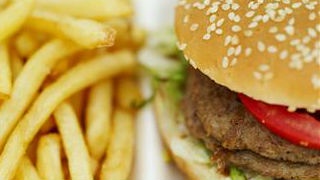High intensity exercise suppresses yearnings for unhealthy foods, a study by Aberdeen nutritionists has found.
We are more inclined to select low calorie options such as fruit and vegetables following one hour of running at speed, according to research published today in the American Journal of Clinical Nutrition.
fMRI scans were used to chart appetite responses in the brain, in the study lead by scientists from the University of Aberdeen’s Rowett Institute of Nutrition and Health. Their research is among the first to use brain imaging to examine the relationship between food choices and exercise.
It’s hoped their findings will enhance understanding of how exercise interventions can be best used in the future to tackle obesity.
Dr Daniel Crabtree from the University of Aberdeen’s Rowett Institute of Nutrition and Health said: “The key aim of our research was to examine the brain’s responses to high and low calorie food following a period of acute exercise.
“Our focus was on a region of the brain called the insula - commonly referred to as the ‘primary taste cortex’. Activation in this region is increased in the anticipation of foods, and when consuming foods that we perceive as being pleasant.
“We asked 15 healthy men to run at speed for one hour before undergoing an fMRI brain scan, during which time they viewed pictures of healthy and unhealthy foods.
“In a second visit, they were asked to rest for one hour before viewing the same set of images.
“Our findings showed that activation in the insula was reduced when looking at pictures of high calorie foods such as pizzas, burgers and doughnuts, following exercise.
“When viewing low calorie options, for example apples, strawberries, carrots and grapes, activity in this region increased.
“We also asked people to rate their hunger levels and took blood samples to analyse two hormones relating to appetite stimulation and suppression.
“After running the volunteer’s feelings of hunger were suppressed, and the appetite hormone analysis showed us that levels of the appetite stimulating hormone were reduced whilst levels of the appetite suppressing hormone were increased.”
The scientists behind the study believe their findings may be related to greater thirst levels reported following exercise.
Dr Crabtree continued: “We know that part of the brain’s insula also plays a role in regulating thirst. We therefore believe that increased activity in this region following exercise could be linked to volunteers perceiving low-calorie foods as having a greater water content than the high-calorie foods, and therefore more able to satisfy their exercise-induced thirst.
“Our theory is supported by previous research which has shown that feeding to restore energy balance following exercise-induced energy expenditure may be delayed to allow fluid balance to be restored.”
Dr Crabtree says more work is required to understand how this relationship between exercise and appetite could be used in the development of programmes to tackle obesity.
He said: “Our study focused on brain activity in healthy, lean volunteers. Further studies, encompassing volunteers who are overweight or obese, and employing different workouts and intensities are required in order to formulate how this link between brain activity and exercise could be best used in the development of advice for healthy weight loss."


